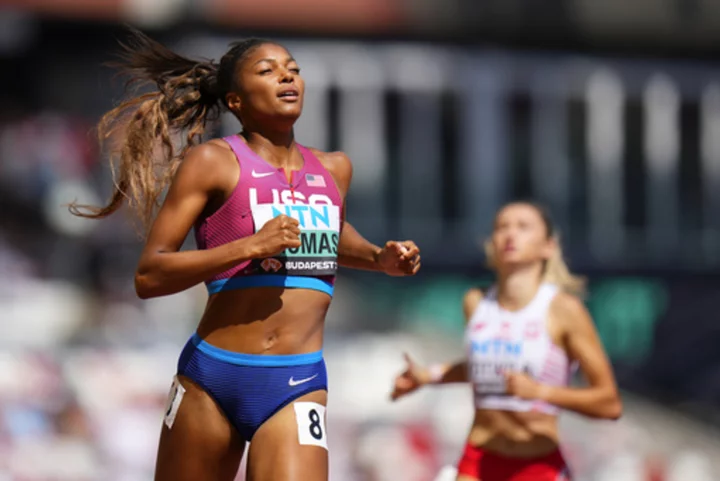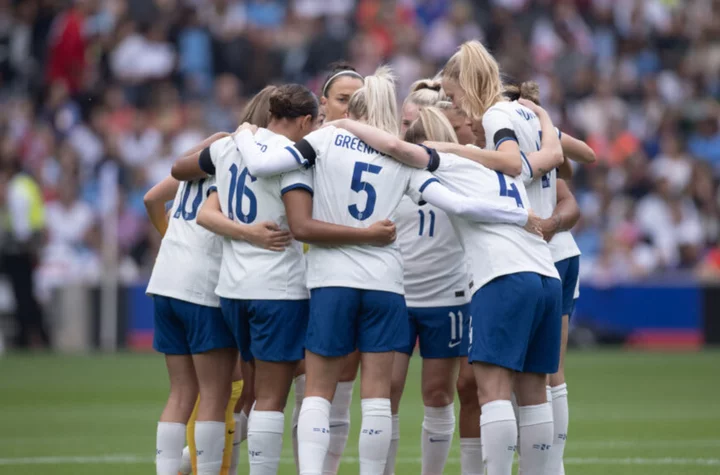BUDAPEST, Hungary (AP) — Rest assured, Gabby Thomas is a big believer in the power of a good night’s sleep.
Because to dream big, the American sprinter must first dream well.
Thomas wrote a paper on the subject of rest as part of her recently completed master's degree from the University of Texas. It’s a look at racial disparities in sleep disorders and evaluates sleep epidemiology among Black Americans.
Her takeaway is simple: Catching valuable shut-eye matters. A lot.
She’s going to need her rest given what lies ahead for her at the world championships. Thomas began Wednesday by winning her first-round heat of the 200 meters. The semifinals and final follow the next two days before the 4x100 relay (final on Saturday) and possibly the 4x400 relay (Sunday).
Good night, indeed.
“The biggest takeaway for me is that sleep is a public health crisis and as a society, we don’t recognize that,” said Thomas, who earned her undergraduate degree in neurobiology and global health from Harvard. “Lifestyle stressors have a significant impact on sleep and is actually linked to many chronic health problems later in life. So while I do prioritize my own sleep so that I can be one of the best runners in the world, it’s also because I’m very aware of the consequences of not getting good sleep now later in life.”
Thomas said sleep holds as much importance to her as a track workout. Or a gym workout. Or a physio session. Or proper nutrition.
“It is most definitely the most important part of my training, and I can’t stress that enough,” she said.
She's hardly alone in her belief about the benefits of a sound sleep. World record shot put holder Ryan Crouser defended his world title last weekend. As much as working on his technique, he credits sleep for playing a role in making him a champion.
“A rule of thumb of athletes at the elite level, they’re all very good sleepers,” Crouser said. “The No. 1 thing you can do to increase your recovery is optimizing your sleep.”
Thomas sees a direct correlation between quality sleep time and her fast times on the track. The 26-year-old has the top 200 time (21.60 seconds) in the world this season, making her one of the favorites over a crowded field that includes newly minted 100-meter champion Sha'Carri Richardson, who was the fastest Wednesday in qualifying.
“Sleep is so easy to neglect,” said Thomas, who was hampered by a hamstring injury last season and missed the worlds in the 200. “We live in a society where sleep is really such an afterthought. Not getting enough sleep is an epidemic in our country and it’s something that is not talked about or taken seriously.”
Thomas would like to see the sleep and rest folded into the ever-growing conversation about mental health.
“Not getting eight hours of sleep, that has really, really bad health outcomes," Thomas said. "It’s scary.”
Catching quality sleep is far from easy for athletes who travel the world, skipping through time zones, sometimes from week-to-week. Circadian rhythms get interrupted. Routines get altered. Budapest, for instance, is seven hours ahead of Thomas’ home in Texas. Often in track, athletes will spend part of their season competing across Europe. For major events, athletes try to come over days or weeks in advance so they can adjust.
Simple things Crouser does to keep his sleep schedule on track include limiting the blue-light exposure from the phone two or three hours before drifting off. He stops eating at least two hours before going to sleep. He uses blackout curtains in the room, and even tapes his mouth to ensure he’s breathing out of his nose.
Women's 20-kilometer racewalk winner Maria Perez of Spain took action after tossing and turning the night before her race because of nerves.
“Was forced to call to our doctor for help and medicines to help me take ... rest,” Perez explained. “It helped and I felt more or less fresh in the morning."
For Thomas, her routine includes taking magnesium, which can play a role in healthy sleep.
A well-rested Thomas has been able to incorporate even more into her training. She’s been running everything from the 100 to the 400 this season. By dabbling in the 400, Thomas feels even stronger in the 200.
“I have a very strong finish that’s tough to beat,” said Thomas, who earned a bronze medal in the 200 at the Tokyo Olympics in 2021. “The women’s sprints are on fire across the board right now, and I think we’re all really pushing each other to do special things on the track. I know that in training, I can’t slack off.”
Or with her sleep.
“I came to worlds doing everything right — allowing myself time to adjust to the time zone, sleeping adequately, eating well," Thomas said. “Because even the smallest lack of sleep can have profound effects.”
___
AP sports: https://apnews.com/sports









